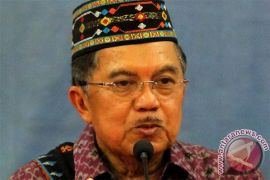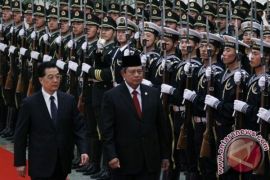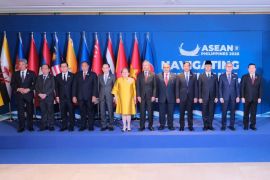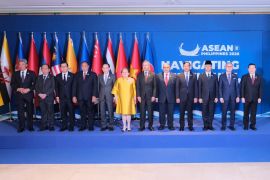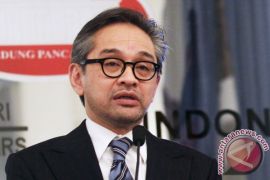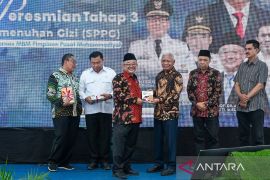All countries in conflict must benefit from the Declaration of Conduct (DoC) for all parties in the South China Sea, the President said after receiving an honorary doctorate degree from the Tsinghua University in Beijing on Friday (March 23).
The South China Sea in the Southwest of Pacific has both regional and international significance because it is one of the world's busiest international trade routes. It contains more than 100 small islands and reefs, spreading over 158,000 square miles of land.
It includes a group of islands called the Spratlys, which are claimed in whole or partly by China, the Philippines, Brunei, Malaysia, Vietnam and Taiwan.
These islands are believed to hold fish, oil and natural gas reserves. Further, members of the Association of Southeast Asian Nations (ASEAN) signed a non-binding pledge in 2002 stating they would settle the South China Sea disputes peacefully.
Frequent naval clashes between countries in the South China Sea, especially in the area near the Spratlys and the Paracel Islands, have turned the territory into a source of tension in the region.
Yet, in this century of quickening globalization, economic development has become one of the important national interests of these neighborhing countries. For the countries in Asia, especially the ASEAN region, have been at the peak of their economic development.
Under such circumstances, sea power plays a significant role in the economic development and this has led countries in the region to advance their competing interests over the territorial sovereignty of the sea in the region.
Dr. Connie Rahakundini Bakrie of the University of Indonesia noted that from earlier days through today, the South China Sea has been a global hotspot, and many international agencies see the region as a global flashpoint that has the potential to trigger new and wider conflicts in Asia.
Therefore, establishing peace and putting various conflict resolution mechanisms in place will certainly contribute to the settlement of these disputes.
Since the 1990s, efforts have been made by regional countries to stabilize the situation and these efforts have resulted in the ASEAN Declaration on the South China Sea in 1992 and later to the ASEAN-China Declaration on the Conduct of Parties in the South China Sea (DoC) in 2002.
These islands are believed to hold fish, oil and natural gas reserves. Further, members of the Association of Southeast Asian Nations (ASEAN) signed a non-binding pledge in 2002 stating they would settle the South China Sea disputes peacefully.
Frequent naval clashes between countries in the South China Sea, especially in the area near the Spratlys and the Paracel Islands, have turned the territory into a source of tension in the region.
Yet, in this century of quickening globalization, economic development has become one of the important national interests of these neighborhing countries. For the countries in Asia, especially the ASEAN region, have been at the peak of their economic development.
Under such circumstances, sea power plays a significant role in the economic development and this has led countries in the region to advance their competing interests over the territorial sovereignty of the sea in the region.
Dr. Connie Rahakundini Bakrie of the University of Indonesia noted that from earlier days through today, the South China Sea has been a global hotspot, and many international agencies see the region as a global flashpoint that has the potential to trigger new and wider conflicts in Asia.
Therefore, establishing peace and putting various conflict resolution mechanisms in place will certainly contribute to the settlement of these disputes.
Since the 1990s, efforts have been made by regional countries to stabilize the situation and these efforts have resulted in the ASEAN Declaration on the South China Sea in 1992 and later to the ASEAN-China Declaration on the Conduct of Parties in the South China Sea (DoC) in 2002.
The DOC is a first step towards the establishment of a Code of Conduct (CoC) in the South China Sea, which has been under discussion for over a decade.
"The 2002 DOC of Parties in the South China Sea is based on a multilateral dimension, as well as on a convergence of views on the need to peacefully manage the dispute," Bakrie said. "The declaration is only an interim political agreement."
The DOC was discussed during an international seminar, entitled "ASEAN and 10th Anniversary of DOC", and jointly hosted by the Centre for Asian Strategic Studies-India (CASS-India), New Delhi, India and the Cambodian Institute for Cooperation and Peace (CICP) on March 22 in Phnom Penh, Cambodia.
"The 2002 DOC of Parties in the South China Sea is based on a multilateral dimension, as well as on a convergence of views on the need to peacefully manage the dispute," Bakrie said. "The declaration is only an interim political agreement."
The DOC was discussed during an international seminar, entitled "ASEAN and 10th Anniversary of DOC", and jointly hosted by the Centre for Asian Strategic Studies-India (CASS-India), New Delhi, India and the Cambodian Institute for Cooperation and Peace (CICP) on March 22 in Phnom Penh, Cambodia.
The seminar focuses on the importance of the adoption of a Code of Conduct in the South China Sea, which would further promote peace and stability in the region.
Commenting on the significance of the seminar, Arata B Mahapatra, Director of CASS-India said, "The conference can throw in new ideas and evaluate various options to resolve the most complicated maritime dispute of our time and, at the same time, the SCS dispute may prove to be a strong challenge to ASEAN diplomacy, as to how it can effectively convert the DoC into a full fledged CoC."
Meanwhile, Dr Vannarith Cheang, Executive Director of CICP, suggested that the South China Sea issue is one of the most complicated regional issues, which requires both trust and a rules-based approach.
Commenting on the significance of the seminar, Arata B Mahapatra, Director of CASS-India said, "The conference can throw in new ideas and evaluate various options to resolve the most complicated maritime dispute of our time and, at the same time, the SCS dispute may prove to be a strong challenge to ASEAN diplomacy, as to how it can effectively convert the DoC into a full fledged CoC."
Meanwhile, Dr Vannarith Cheang, Executive Director of CICP, suggested that the South China Sea issue is one of the most complicated regional issues, which requires both trust and a rules-based approach.
"We need more dialogue and discussions in order to promote understanding over the issue," he said.
Speakers at the seminar, including Dr. Connie Rahakundini Bakrie, made an effort to discuss topics, such as the strategic importance of the South China Sea lanes of communication for Asian trade and commerce, the significance of the conclusion of DoC in 2002 between ASEAN and China, the importance of ASEAN unity, and political solutions to the South China Sea dispute.
Chairmanship of ASEAN
The DoC was first adopted in 2002 in Phnom Penh and now, after 10 years, when Cambodia has stepped into its role as rotating head of ASEAN, one can hope to reach a strong approach towards resolution of South China Sea conflicts.
"The Cambodian chairmanship of ASEAN in 2012 will provide a favorable condition to restore and strengthen trust and confidence among the claimant states of the South China Sea. Cambodia can be an effective moderator since it is not a claimant state, and can provide a neutral and impartial position to calm down the South China Sea conflict, or issue through frank and open dialogues," said Vannarith Chheang.
The role of international law, including UNCLOS, in maintaining peace, stability and development in the South China Sea and promote the guidelines for DOC implementation, conflict resolution models, and new ideas for the South China Sea dispute.
Dr. Connie R. Bakrie has said while ASEAN does not openly take a position on various claims and counter claims, it is committed to stability in the South China Sea and a peaceful resolution of the problem.
To help control potential armed conflicts in the South China Sea, ASEAN has pressed China to conclude a Code of Conduct (CoC) to replace the DoC. ASEAN hopes that the more legally binding Code of Conduct will encourage all parties to refrain from resorting to force or other coercive measures in resolving disputes over the South China Sea.
From the DOC process, it is probably reasonable to conclude that the CoC process will not be an easy one. Very likely, there will be tough negotiations on the drafting of the CoC. In July 2011 in Bali, the guidelines were at last drawn up following a great deal of collaborative efforts, and it is moving towards the CoC.
"There is a need for ASEAN to do something on the conduct of parties in the South China Sea," Dr. Bakrie said.
The South China Sea is a complicated issue, so it needs a long-term commitment and patience from all parties.
As Vannarith Chheang stated, the situation needs to be changed: From zero sum game to win-win for all parties; from a blame game to frank dialogue and negotiations; from sticking to positions to the understanding of motivations; from strategic competition to strategic and economic cooperation and integration; and from nationalism to regional citizenship and interests.
These are similar to President Yudhoyono's view that the South China Sea is an area for cooperation with the potential to benefit all parties, rather than just an area of conflict.
Speakers at the seminar, including Dr. Connie Rahakundini Bakrie, made an effort to discuss topics, such as the strategic importance of the South China Sea lanes of communication for Asian trade and commerce, the significance of the conclusion of DoC in 2002 between ASEAN and China, the importance of ASEAN unity, and political solutions to the South China Sea dispute.
Chairmanship of ASEAN
The DoC was first adopted in 2002 in Phnom Penh and now, after 10 years, when Cambodia has stepped into its role as rotating head of ASEAN, one can hope to reach a strong approach towards resolution of South China Sea conflicts.
"The Cambodian chairmanship of ASEAN in 2012 will provide a favorable condition to restore and strengthen trust and confidence among the claimant states of the South China Sea. Cambodia can be an effective moderator since it is not a claimant state, and can provide a neutral and impartial position to calm down the South China Sea conflict, or issue through frank and open dialogues," said Vannarith Chheang.
The role of international law, including UNCLOS, in maintaining peace, stability and development in the South China Sea and promote the guidelines for DOC implementation, conflict resolution models, and new ideas for the South China Sea dispute.
Dr. Connie R. Bakrie has said while ASEAN does not openly take a position on various claims and counter claims, it is committed to stability in the South China Sea and a peaceful resolution of the problem.
To help control potential armed conflicts in the South China Sea, ASEAN has pressed China to conclude a Code of Conduct (CoC) to replace the DoC. ASEAN hopes that the more legally binding Code of Conduct will encourage all parties to refrain from resorting to force or other coercive measures in resolving disputes over the South China Sea.
From the DOC process, it is probably reasonable to conclude that the CoC process will not be an easy one. Very likely, there will be tough negotiations on the drafting of the CoC. In July 2011 in Bali, the guidelines were at last drawn up following a great deal of collaborative efforts, and it is moving towards the CoC.
"There is a need for ASEAN to do something on the conduct of parties in the South China Sea," Dr. Bakrie said.
The South China Sea is a complicated issue, so it needs a long-term commitment and patience from all parties.
As Vannarith Chheang stated, the situation needs to be changed: From zero sum game to win-win for all parties; from a blame game to frank dialogue and negotiations; from sticking to positions to the understanding of motivations; from strategic competition to strategic and economic cooperation and integration; and from nationalism to regional citizenship and interests.
These are similar to President Yudhoyono's view that the South China Sea is an area for cooperation with the potential to benefit all parties, rather than just an area of conflict.
However, for the sake of long-term peace and stability in the South China Sea, it is important for all parties to have a legally-binding CoC.
(M016/INE)
Reporter: Mohammad Anthoni
Editor: Ade P Marboen
Copyright © ANTARA 2012

